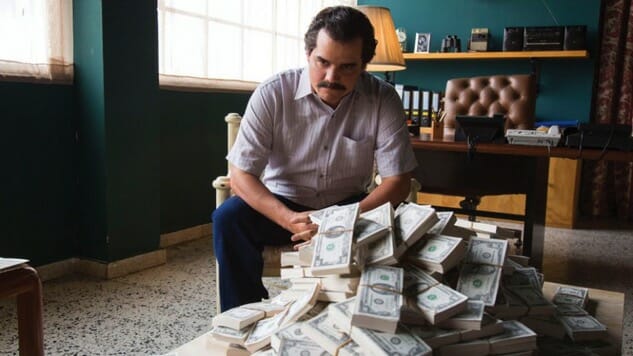
It wasn’t exactly surprising when Netflix revealed last week that it had commissioned two more seasons of its hugely popular drugs saga, Narcos. We’re in a time when TV shows tend to stretch on for as long as they’re profitable, and right now, Narcos is making Netflix a mint. All the same, cocaine kingpin Pablo Escobar (played by Wagner Moura) was Narcos’ headline star; now we hear the “blow must go on,” in spite of Escobar’s death at the close of the show’s second season.
To some critics, like Vox’s Todd VanDerWerff and Paste’s own Bonnie Stiernberg, it’s the wrong move. Narcos has up to this point been the story of Pablo Escobar. (Even the show’s theme is specifically about him.) Who could possibly fill the shoes of such a complex figure, going into Season Three and beyond? How will any remaining characters, largely in existence either to serve or pursue Escobar, find purpose in a Pablo-less story?
It’s true that Narcos, from here on out, potentially stands to become a jarringly different show. But that will only be because Escobar will no longer be around to limit what the series can do.
No great TV got that way without some ambition from the creators. The Wire began as a run-of-the-mill cop show set in Baltimore, but by the end of its five-season run it was a show about Baltimore, and America on the whole, unrecognizable from its early episodes, but all the more brilliant for electing to become so bold. With Narcos showrunner Eric Newman’s talk of branching out to look at the cocaine trade throughout Latin America from Season Three onwards, Narcos seems likely to change drastically, but it also has a chance of being remembered as so much more than just The Pablo Escobar Story.
Newman now talks of Mexico and the “revolving-door” nature of cartels. He talks of CIA intervention south of the border and future episodes that focus on El Chapo Guzman. Before we get to that stage, season three will focus on the Cali cartel, which traded in Europe as well as America, and was a vast worldwide operation. This show sounds like one that, with Escobar in the rear-view mirror, will once again take a crucial wide-angle view of the war on drugs.
After a sprawling few opening episodes, Narcos Season One narrowed the focus to just the Medellin cartel, and those trying to bring it down. In Season Two, the show downsized further, making Pablo Escobar into some hangdog antihero around whom all others—including former main characters—orbited. Murphy, Pena and President Gaviria were reduced to almost incidental figures, with Boyd Holbrook given little to do other than read out his largely redundant voiceover. This obsession with Escobar at the end made the show grimly fascinating, like a nine-hour-long death scene, but shrank the scope of a series that’s always been at its best when taking a sweeping view of narco history. Newman has claimed Narcos was “never about” just Escobar, but it appears he and his writing team came close to forgetting that this year.
Such was the obsession with humanizing the mythical Escobar, it’s he that got the attention of all the best writing in Season Two, with the rest of the cast left to pick up the crumbs. Season One was an ensemble drama, but by the second season it appeared Escobar, and the extraordinary Wagner Moura, had become so seductive to the writers that they lost sight of what the show was originally trying to say and do. Narcos became less about Latin America’s devastating cocaine industry, and more about trying to redeem a monster—even if it meant playing around with, or just straight up ignoring the facts to do it.
Did you know for example that ‘Tata’ Escobar was just 15 when Pablo took her as his wife? Or that Escobar held orgies with underage virgins at his place, from which some of those girls would never return Such truths were left out of the show by Newman and team, quite probably because they’d make it impossible for viewers to empathize. As the effort to humanize Escobar intensified, Narcos began to lose its moral compass as well as its grip on reality.
There’s one other crucial Narcos problem that’s set to be solved by Pablo Escobar’s departure. It’s been implied that Holbrook’s Steve Murphy will now exit the show, at least as a main character, following Pablo’s death. With Escobar’s demise, the real Murphy’s life in Latin America ended (with his career as a DEA agent not far behind). Meanwhile, the Season Two finale hinted that Pedro Pascal’s Javier Pena will stick around and perhaps even take the reins as the show’s new lead. Out goes the problematic and underwritten white savior, replaced by the American Latino cop character—lent real charisma and nuance by a star in the making—that should probably have been the lead all along.
There will be no “replacement” for Pablo Escobar, says Newman. Rather, a “complex, multicelled organism” will take his place. No longer will Narcos be about a “singular, extraordinary danger,” as Steven Cohen put it at The New Republic, with the show’s creators heavily invested in a myth, while neglecting the enormous reality of the drugs issue.
Now that this towering figure is out of the way, there’s nothing blocking the view of a wider and even more important story. If done right, Narcos could now become a major televisual portrait of the war on drugs.